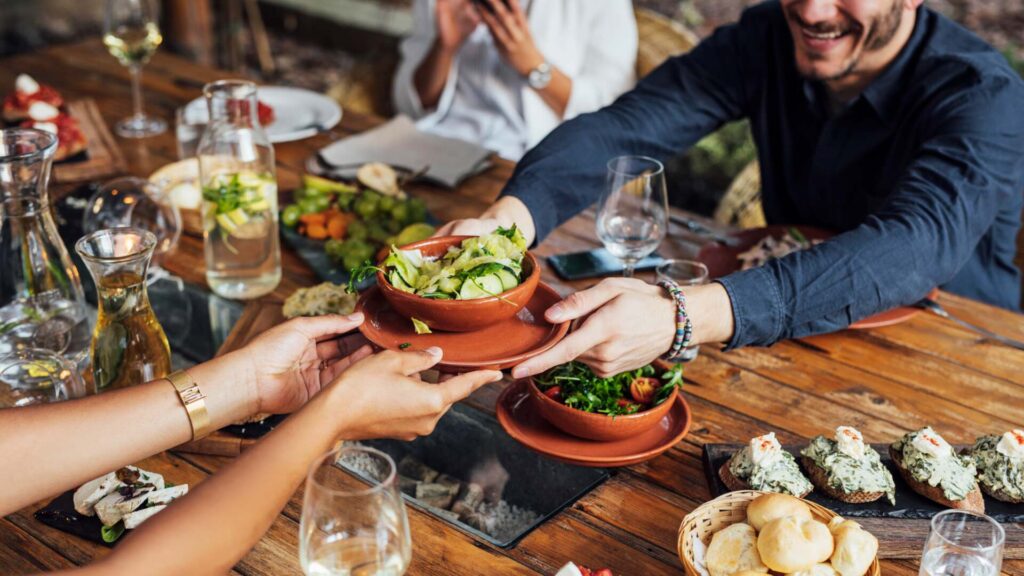What Businesses Need to Consider After Dry January and Veganuary
Written by Team 365 Finance

For years, men grew moustaches to be part of Mo-vember to raise awareness of health issues that affect males across the world, and it’s spread to the rest of the year. Many calendar months now have a cultural awareness event, or a challenge attached — and the turn of the year is host to Dry January and Veganuary, where individuals pledge to change their diet for the month.
The low and no alcohol opportunity is growing, and veganism has spread further than just a month-long challenge — so while Dry January and Veganuary are great ways to promote sobriety and vegan lifestyles, it is far more than just a trend.
As such, restaurants and pubs need to adapt to these changing consumer behaviours to increase profits in the long term, not just for January.
Keep reading to find out more about these January challenges, and what you can do to adapt your business for consumer lifestyle choices.
What are the January Challenges?
Let’s look at the two challenges that start off the year, and affect restaurant and hospitality businesses the most.
What is Dry January?
Run by Alcohol Change UK, Dry January involves millions of people giving up alcohol for the month of January. The first Dry January campaign began in 2013, with 4,000 people signing up for the challenge. The campaign has grown in leaps and bounds, with over 130,000 signing up to the change for January 2021.
According to surveys carried out by Alcohol Change UK, almost a third of those surveyed (28%) felt themselves drinking more in 2021, compared to 2020. With the pandemic committing everyone to their homes, this could have contributed to people becoming more aware of how much alcohol they consume.
This year, now that COVID restrictions have eased, one in six (18%) adults who drink alcohol took a month off drinking for Dry January 2022, or one in seven (15%) of all UK adults. This is estimated at 7.9 million UK adults – a 22% increase from 6.5 million last year.
Although the benefits of drinking less are fairly obvious to many, Alcohol Change UK have stated some results that their participants note:
– 70% of participants sleep better
– 86% save money over January
– 65% notice generally improved health
Moreover, 70% of participants continue to drink in a more healthy way after Dry January, showing the month-long pledge has an opportunity for hospitality businesses to adapt throughout the rest of the year.
What is Veganuary?
Run by Veganuary, a non-profit organisation, Veganuary encourages people worldwide to try a plant-based diet for January, and hopefully beyond. The first Veganuary took place in 2014, and has grown to more than 500,000 people going plant-based for the first month of 2021.
For the sake of clarity, here’s the difference between vegetarian and vegan diets, if you are unfamiliar:
– Vegetarian diets include some animal products, such as dairy and eggs, but does not include meat.
– Those who follow vegan diets do not consume any products that are derived from or include ingredients that come from animals, such as meat, dairy or eggs, and sometimes even exclude animal by-products, like honey.
There are a number of restaurants and pubs providing extensive vegan options beyond just Veganuary, which means your business could have fierce competition when it comes to plant-based options. If you haven’t pivoted your business to accommodate vegan consumers, then you could be alienating local customers and missing out on growing your profit margins from this burgeoning market.

(There are a number of restaurants and pubs providing extensive vegan options beyond just Veganuary, which means your business could have fierce competition when it comes to plant-based options.)
How Low and No-Alcohol Consumption and Vegan Lifestyles are on the Rise
Although the Dry January and Veganuary movements are gaining more and more participants every year, the lifestyle changes occurring in the national consciousness are going beyond just a one month activity.
A report by supermarket Sainsburys predicted that by 2025, vegans and vegetarians will make up a quarter of the British population in 2025, whilst flexitarians (those who eat both plant-based foods and meat-based) would make up just under half.
Already steady growth is being seen in those adopting a vegan diet. In 2014 (the start of Veganuary) only 150,000 people in the UK (0.25% of the population) identified as following a purely plant-based diet. Two years later, the total had almost doubled to 0.46% of the population, and in 2019 it doubled again, with a massive 600,000 people attesting to following a vegan diet. That is 1.16% of the population in 2019 and has likely grown even more since then.
And shops UK-wide have jumped on this growth. Almost every UK supermarket has their own vegan range, and many takeaway chains and restaurants who did Veganuary revealed their own permanent vegan menu options — the new Burger King Plant-Based Whopper, and the McDonalds McPlant options being the newest releases.
Veganuary themselves saw 825 new vegan products and menu options launch in their key campaign countries over the last few years, so it’s not just a January trend — the demand is available and growing in restaurants and supermarkets, all year round.
When it comes to reducing alcohol intake, many members of the public are increasingly drawn to be ‘sober curious’.
After Dry January, one in three UK drinkers now regularly choose low or no alcohol products.
Around 20% of the UK population don’t drink at all – and this figure is increasing among young people in particular.
Low and no alcohol beers actually represented 5% of the overall beer market in 2020, and low and no beer options are at 6% growth in the UK, compared to the wider beer market which is actually predicted to be flat or slightly declining.
Though beers seem to be the leading product, there have been influencers such as Spencer Matthews showcasing their ‘free-from’ spirit options to huge audiences on social media, and you can find alcohol free options easily, such as CleanCo and Seedlip, for cocktails.
The opportunity for the public to be more specific about what they consume is at an all-time high — but what can you do about it in your business?
What Does the Sober Curious and Plant-Based Culture Shift Mean for Your Business?
Based on these statistics and forecasts, it’s clear that pubs, restaurants, and takeaways nationwide need to adapt and cater for this growing consumer market, beyond the January trends. If you’re a pub, no longer will a soda gun and cordial be enough to serve your no-alcohol customers. And restaurants should look further than a vegetarian curry to meet the expectations of their customers who now have so much choice in stores.
How to Cater for Sober Curious and Vegan Lifestyle Choice
Those who choose not to drink, or are making a conscious effort to drink less, still want to go out and enjoy social time with their friends. To accommodate the demand, you should stock a wide range of low and no alcohol beverages so that customers don’t feel alienated by limited options at your establishment.
You might even find that customers prefer to take a non-alcoholic or low alcohol drink in a glass so that their choice doesn’t look different to their peers. Demand for low and no options has increased but offering ‘normal’ glassware can help you be sensitive to the needs of your customers who want to ‘fit in’ with their group, but drink less.
By doing so, your business will appeal to individuals who want to socialise without the difficulty that ‘not drinking’ could bring. If you are a small business then you could draw in more customers from the area who’ve heard about your wide variety of options after Dry January, and if you are a chain then you’re catering to a growing market in the long-term— it’s a win-win.

(If you’re a pub, no longer will a soda gun and cordial be enough to serve your no-alcohol customers.)
When it comes to food, conscious consumers will research restaurants who participate in Veganuary, or check out menus in advance online to ensure there are suitable options for their eating habits.
So, to make sure you’re looking after your customers who are making a significant change, look into how you can make any popular dishes vegan or vegetarian, and look into creating new menu options for vegans. Try to have a few tasty options (depending on how large your menu is) because only one vegan dish is probably not enough to show that you care about vegan customers, during Veganuary and beyond.
Other things to consider are the snacks that your establishment stocks. Take a close look at the ingredients in home baking, bar snacks, sauces and even your wine to make sure that your customer can easily access vegan options from you. Be knowledgeable about the products and foodstuffs that you stock to gain the trust of your customers — if you can’t answer their questions about ingredients then they’ll simply find somewhere else that can cater to their lifestyle and dietary requirements.
It’s clear that pivoting your business to cater for this growing consumer market will reap greater profits in the long-term, by gaining trust from your customers, creating repeat business, and opening your doors to a wider range of consumers.
How 365 Finance Can Support Your Business Shift
Don’t let your business lag when it comes to changing customer behaviours. If you’re looking to increase your low and no alcohol stock and vegan options, there are some fast and affordable financing options that can help.
Instead of resorting to credit cards or overdrafts, revenue financing from 365 Finance offers an affordable solution.
If your business accepts credit and debit card payments, 365 Finance allows you to borrow cash and pay back little by little. Get your hands on sums between £10,000 and £500,000 today and invest in scaling your business to new heights.
Unlike a traditional bank loan, there are no interest rates or fixed monthly payments to worry about. Instead, repayments are taken from a percentage of your debit and credit card payments.
This means repayments will follow the ups and downs of your business, easing financial stress — when you have a quiet period, repay less; when things pick up, repay more.
Discover more about how revenue financing can help you grow your business here and click to apply for your tailored quote from 365 Finance today (applying will not affect your credit score).